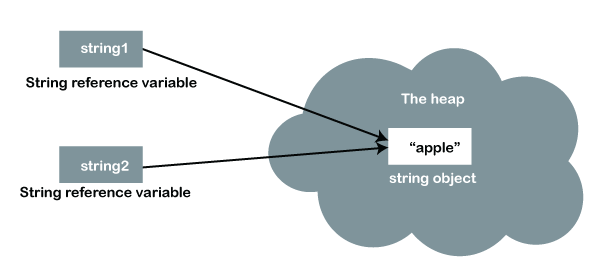Why Are Strings Immutable in Java? Comprehensive Evaluation for Programmers
Why Are Strings Immutable in Java? Comprehensive Evaluation for Programmers
Blog Article
What Is Immutable Strings and Exactly How It Functions
In the world of shows, understanding the idea of immutable strings is critical for developing durable and safe and secure applications. Immutable strings refer to strings that can not be changed after they are developed, making sure information honesty and predictability within the code. This fundamental concept plays a crucial duty in different shows languages and uses an unique technique to handling information. By checking out the details of exactly how unalterable strings function, one can discover a world of benefits and opportunities that can elevate the high quality and performance of software development.
The Essentials of Unalterable Strings
Unalterable strings, as a fundamental idea in programs, are character sequences that can not be altered as soon as they are created. This implies that once a string is appointed a value, that worth can not be modified. In languages like Python and Java, strings are immutable objects, causing various effects in regards to memory management and information stability.
Among the crucial benefits of immutable strings is that they offer a sense of safety in data adjustment. Given that the web content of an immutable string can not be customized, it ensures that the original information remains undamaged, reducing the danger of unexpected changes during program implementation (Why are strings immutable in Java?). This property additionally streamlines debugging processes, as programmers can trust that as soon as a string is specified, its worth will certainly not be accidentally altered
When a brand-new string is developed based on an existing one, rather than modifying the original string, the brand-new worth is saved independently. On the whole, understanding the basics of immutable strings is important for mastering programming principles and optimizing code performance.
Advantages of Immutable Strings
Structure upon the protection and efficiency advantages of immutable strings, their benefits prolong to enhancing code integrity and streamlining simultaneous shows tasks. By being unalterable, strings can not be customized after development, which gets rid of the risk of unexpected adjustments in the information they keep. This fundamental immutability makes certain that once a string is produced, its worth continues to be constant throughout the program's execution, reducing the possibilities of pests brought on by unanticipated alterations.
In addition, immutable strings add to code integrity by making it less complicated to reason about the state of a program. Because strings can not be altered, programmers can rely on that a string will always hold the very same value, simplifying debugging and maintenance initiatives. This predictability causes much more secure and dependable codebases.

Implementation in Programs Languages
Within various programming languages, the unification of immutable strings is a fundamental aspect that influences exactly how data is taken care of and controlled within code frameworks. The execution of immutable strings varies across different shows languages, with each language using its very own mechanisms to support this idea.

On the other hand, languages like C and C++ do not have built-in support for unalterable strings. Programmers in these languages must manually carry out immutability by applying policies within their code to avoid direct modifications to string things.
Ideal Practices for Functioning With Immutable Strings
When managing unalterable strings in programs languages like Java and Python, sticking to finest methods guarantees efficient and safe and secure information adjustment. Among the crucial best practices is to utilize StringBuilder or StringBuffer rather than straight controling strings, especially when handling comprehensive concatenation operations. These classes give mutable alternatives for string manipulation, assisting to prevent unneeded memory allotments and improving efficiency.
Furthermore, when functioning with sensitive information such as passwords or API secrets, it is important to stay clear of storing them as simple text in unalterable strings. Making use of protected storage devices like char arrays or specialized collections for handling delicate info helps reduce security risks linked with immutable strings.
Real-world Applications and Examples
Discovering functional executions of immutable strings in different industries exposes their substantial effect on information stability and system reliability. In the medical care field, unalterable strings play a vital role in ensuring the safety and confidentiality of person data. By protecting against unapproved alterations to sensitive info such as medical learn the facts here now documents and prescriptions, unalterable strings aid preserve compliance with strict personal privacy policies like HIPAA.
Banks additionally gain from the immutable nature of strings to enhance the protection of consumer information and transaction records. Immutable strings assist avoid fraudulence and unauthorized changes to financial information, supplying a durable protection against cyber threats and ensuring the trust and self-confidence of customers.

Conclusion
In verdict, unalterable strings are repaired and stable sequences of personalities that use benefits such as thread safety and security and enhanced efficiency in shows. They are applied in different programming languages to ensure data honesty and safety and security. Finest methods for dealing with unalterable strings consist of preventing direct adjustments and making use of methods that return brand-new string things. Real-world applications of immutable strings include information file encryption, caching, and string control jobs.
Unalterable strings refer to strings that can not be changed after they are created, guaranteeing data honesty and predictability within the code. When a new string is produced based on an existing one, rather than customizing the original string, the new worth is saved independently.In languages like Java and Python, strings are unalterable by default, meaning that when a string object is created, its worth can not be altered - Why are strings immutable in Java?. Finest techniques for working with unalterable strings consist of staying clear of direct modifications and using approaches that return new string things. Real-world applications of immutable strings consist of information encryption, caching, and string adjustment jobs
Report this page